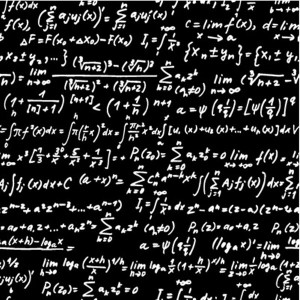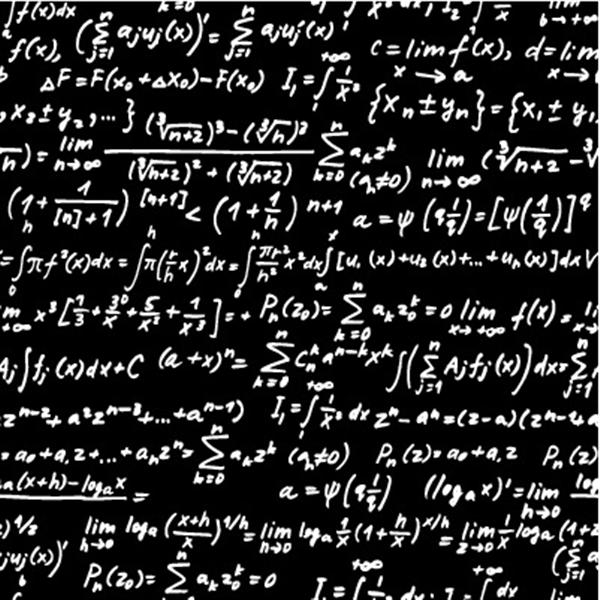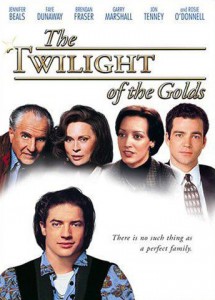 Maths sucks. This is a universal fact, accepted without hesitation by generations of schoolchildren for decades. It’s hellishly difficult, labyrinthine in its endless complexities and, on rare occasions, can end up driving you suicidally insane. Though most of us don’t descend to that level of frustration, the vast majority of us can comfortably agree that mathematics is a discipline seemingly created for no other purpose that to graft interminable periods of boredom onto our childhoods when we could’ve been doing something constructive like smoking or eating glue.
Maths sucks. This is a universal fact, accepted without hesitation by generations of schoolchildren for decades. It’s hellishly difficult, labyrinthine in its endless complexities and, on rare occasions, can end up driving you suicidally insane. Though most of us don’t descend to that level of frustration, the vast majority of us can comfortably agree that mathematics is a discipline seemingly created for no other purpose that to graft interminable periods of boredom onto our childhoods when we could’ve been doing something constructive like smoking or eating glue.
Unfortunately, mathematics also happens to be an important key to unlocking a life of greater knowledge and possibilities. Math is what underpins economics, science, technology and society. To be mathematically adept is to be able to manage your taxes and other personal finances to your benefit. It is to understand the greater monetary forces that dictate life on this planet, who they benefit and by how much, and how many people are excluded. The concept of time is a mathematical one, establishing a system of numerical rules and distances by which our lives are segmented, portioned out on different tasks and memorised as particular eras. From the daily wages we scrape together to the number of EXP we’ve accumulated on the latest MMORPG, mathematics IS order in human society.
Which is why we ordinary workers have come to hold maths with such hatred and ignorance. Such an incredibly valuable field to develop skills and interests in is too dangerous for the ruling classes to allow, so they’ve structured the teaching of mathematics in schools to be as achingly boring and futile as possible. How many people, for example, complain that algebra serves no purpose? Billy Connolly, for one, and no doubt many hundreds of millions share the same view. This is despite there being hundreds of useful applications of mathematical and statistical methods and equations that can be utilised for important work, even in a domestic context, yet these are precisely the techniques that are deliberately left out of the world’s classrooms. What we’re left with is a ramshackle collection of various theorems, divisions and abbreviations that appear to have no connection with each other or the world outside the numbers on the whiteboard, with every other subject in the school curriculum holding more merit than this.
My point is proven to a disturbing level. On the BBC is a story about how many adults in Britain know so little maths, and it makes for shocking discovery. Of the many depressing statistics is that while every other developed nation manages to encourage its adolescents to continue studying maths after the age of 16 at a rate of between 50-100%, the figure in Britain is just 15%. That’s something I can relate to. When I started college in September 2006 every one of the people I met there had to retake their GCSE maths exam because they had all failed to score a grade of ‘C’or higher in their exam the previous summer. Most people failed the retake examination that November, and some people still have not achieved a passing grade even now, six years later. I myself only just managed to attain a ‘C’, and even then I answered barely a third of the exam papers, my test performances more wild improvisation than any serious application of knowledge.
I was never at such an imcompetent ability before. Throughout my entire school career I had scored consistenly high results in maths exams and I was placed every year in the highest set for the subject. But by the time I started my GCSEs in Year 10 (equivalent to Ninth Grade in American schools) my interest in maths, and only maths, completely evaporated, with my realising my serious lack of knowledge only a few weeks before the final exams themselves. In that period I tried frantically to cram the last few schooltime lessons before the study leave break, and found a total blackout; in the 17 months from September 2004 to April 2006 I had virtually lost any and all understanding of mathematics I had ever possessed. It was sheer luck that I passed those exams, and my mathematical deficiency ever since has haunted me as a symbol of intellectual weakness.
No doubt this feeling manifests itself in most people as more of a twinge of stress and annoyance at not being able to do basic adding and subtracting when it is most necessary. The BBC report showed the difficulties people face even by something as simple as converting a twenty-four-hour bus timetable into twelve-hour times. It’s staggering such a situation exists where an entire population has the mathematical ability of an 11 year-old.
But what it shows is the deliberate neglect by the government to ensure its country is properly educated. While I accept that my own failure in learning maths had a lot to do with my personal life at the time, still I never found the subject interesting or inspiring whichever of the many teachers I had taught me it. Maths classes were always the most disruptive, the ones where the pupils ignored the teacher and listened to their MP3s in blatant refusal of studying. But the biggest problem is that school-level education is all you get; once you finish college you then have to pay to be taught anything further. The public adult education system in this country is nonexistent, appearing in such academically useless forms as community groups that hold sessions on sewing or photography. Being creative is no substitute for acquiring academic knowledge, and the government does everything it can to eliminate opportunities for the working class to educate itself. If you can’t add up or read, then how can you possibly know what you’re voting for?
The destruction of learning pleasurably is reflected in the severe lack of knowledge this country has of mathematics, a foundational skill for navigating your way through this ever increasingly complex life. For children and adults alike they are being slowly but successfully convinced that academic study at any stage of life is useless and difficult and a waste of time, and our society decays in the most ugly and horrific way because of this attitude. Algebra is unlocking the secrets of the universe itself; that, for Mr Connolly and company, shows at least one useful purpose it serves. Which other ones can you find?
Life of Pi?,




Iyam
2 Mar 2012if there were any of my friends that could wrap their heads around this, it would be my ex-roomie, Net Runnr.
Lexan
2 Mar 2012funny thing about math – i’m a chef, so i have to convert recipes as part of my job. i do it all day long, in my head, with fractions and decimals and back again, without a problem. take food out of the equation and give me the same problems, i’m instantly a moron. makes no sense at all but it’s the truth.
Net Runnr
2 Mar 2012the key is to have a teacher who teaches you that every equation is a drawing of some sort, whether two dimensional or three. Lexan can prolly do the cooking math in his head because he SEES the 1/3 tablespoon as a picture or the 1/2 cup of liquid as a visual. take away that visual and suddenly it is pure addition/subtraction…. which is not good.
in other words – maybe they need to change the way math is taught. it is not an equation to memorize but it is a line that has an equations, a curve or sphere that has an equation… a planet that orbits in a certain equation or a star that moves along a certain line that is an equation…. when I was a kid someone said to me what is 30% off a 100…. and I did not know. then they said what is 30 cents off a $1 and I knew… I had a visual.
Larry
2 Mar 2012This article is about the state of math education in Great Britain, but I see similar problems with the way math is often taught here in the U.S.A. Two examples: 1) Kids are often only taught the mechanics of math and not the logic behind it. This is why they do not appreciate math and its beauty. 2) The examples (problems, exercises, etc.) given to students to solve often do not relate to the students in their world. This is why they do not understand why math is important.